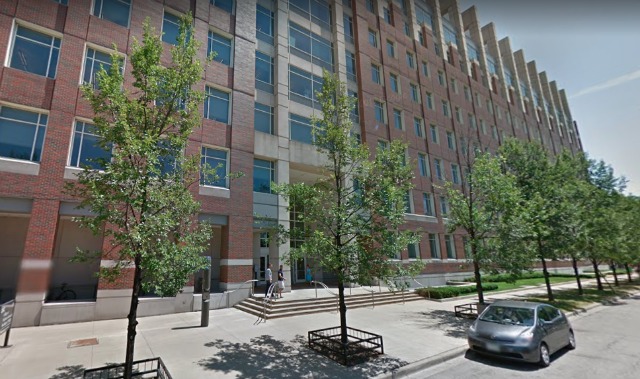2 Arrested At UIC After Disrupting Panel That 'Supports Targeting Muslims,' Protesters Say
By Stephen Gossett in News on Oct 28, 2017 5:55PM

University of Illinois at Chicago College of Medicine Department of Psychiatry Research Building
Two protesters were arrested on Friday morning after demonstrators disrupted a panel at the University of Illinois at Chicago, claiming that speakers support a federal program that they argue targets Muslims and Arabs, the group said.
The event on Friday gathered speakers to discuss prevention strategies against “ideologically inspired” violence by incorporating a mental health approach. But demonstrators charge that participant Christian Picciolini, the reformed Neo-Nazi who co-founded the anti-extremist outreach group Life After Hate, supports the federal government’s controversial Countering Violent Extremism (CVE) program—which protesters argue uses a racist framework and “junk science” to unfairly identify people as susceptible to violent extremism.
Picciolini denied the characterization. “Of course I do not advocate a federal surveillance program that targets Muslims, Arabs, or any other innocent or law-abiding American,” he said in an email to Chicagoist.
Protesters also took issue with the appearance of Junaid Afeef, director of the Targeted Violence Prevention Program (TVPP), at the Illinois Criminal Justice Information Authority. Critics argue that TVPP employs similar flawed metrics as CVE while using the public health approach “to make a local manifestation of the federal CVE program appear more friendly than it is.”
Afeef did not immediately return a request for comment, but his organization in the past has argued that common criticisms against CVE do not apply to TVPP.
.@JunaidAfeef has made a career criminalizing Arabs & Muslims through @ICJIA_Illinois “Targeted Violence Prevention” #EndRacialProfiling pic.twitter.com/GqZYdv9euu
— AAAN (@aaanmarkaz) October 27, 2017
CVE uses junk science and is funded by the Feds to profile Muslims and Arabs #stopcve https://t.co/fgFtrpGl2T pic.twitter.com/UvWXfwZVew
— debbie s (@madlittledebbie) October 27, 2017
One of the arrested protesters, Debbie Southorn, has written critically of CVE and of Life After Hate’s decision to include a component of its operation toward countering Islamic extremism. Critics argue that CVE anti-jihadist measures in fact manifest as criminalizing Muslim communities. They attempt to target “pre-terrorists” by flagging unreliable, problematic indicators of radicalization, and encouraging profiling, while relying on models similar to controversial gang databases and FBI models, critics contend.
(According to WTTW, Life After Hate’s grant application outlined an effort to “automate the process of identifying individuals at risk of radicalization” by using “a series of online identifiers (including keywords, links, images and groups) to build a database of US-specific far-right and Jihadist extremist risk factors online.”)
Life After Hate—which made headlines earlier this year when the Department of Homeland Security yanked a CVE grant that the organization had been awarded under the Obama administration—had previously focused its mission on de-radicalizing white extremists, but its grant application last year said it would also target an equal number of “Jihadist cases,” according to WTTW.
Hoda Katebi, one of the protesters who was in attendance but not arrested, charged that Afeef and TVPP, which received a $187,000 grant from DHS earlier this year, despite its work with mental health professionals, aims to “infiltrate communities” while also relying on a “false rubric of indicators.”
Picciolini said the protesters were “well-intentioned” but “misinformed.” He drew a distinction between Countering Violent Extremism, the federal program—which he said he does not represent, and agrees was a flawed effort under the Trump administration—and a lowercase “countering violent extremism,” simply the effort to help extremists disengage. (He said he believes Life After Hate lost its federal funding due to his having been critical of the government's CVE program.)
“I offered [the protesters] an opportunity to speak and take my time when they entered, but they refused and just chanted louder without reason… They left calling me and everyone else ‘racist’ and ‘anti-Muslim’ even though half the room were people of color and Muslims.” said Picciolini, who told Chicagoist he is no longer with Life After Hate.
Some days, you just can't win. A well-intentioned, though misinformed, protest at an event I was speaking at this morning. #onthesameteam pic.twitter.com/8PoUEGMugA
— Christian Picciolini (@cpicciolini) October 27, 2017
Katebi countered, “There is no discourse when there is clearly bias and racism. You can't have a conversation when there’s not an equal playing field. This isn’t a conversation that can be had... It’s literally one group of people with money, power and law enforcement behind them criminalizing anyone who looks like me.”
Protesters also said that Picciolini “aggressively” grabbed a folder directly from Southorn’s hands, and ripped it in half. Picciolini said he mistakenly feared it contained personal information of attendees and “the folder ripped in the process as we both tugged at it.”
So... @cpicciolini just literally ripped this out of my arms while challenging a pro-CVE event. Who's nonviolent? pic.twitter.com/7cwXDVj7p0
— debbie s (@madlittledebbie) October 27, 2017
Katebi also charged hypocrisy against ICJIA, which advocates for alternative law enforcement responses and de-escalation, for calling the police.
Picciolini said he doesn’t think the protesters should have been arrested. “I have even offered to provide a statement saying that Debbie did nothing wrong,” he said.